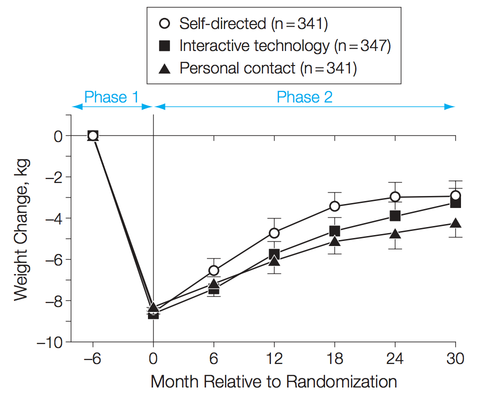Weight Loss: How Practical? |
October 14th, 2014 |
| weight |
Because people tend to regain weight they lose, a study needs to have substantial followup. If you just check back in six months you might find people have lost a reasonable amount, but checking back a few years later they're more likely to be back where they started. So we want at least two years, ideally something like five. Unfortunately it's hard to keep track of people over long periods. They move away, get frustrated, or otherwise drop out of the study. But if the people who drop out of a treatment group are different from the people dropping out of the control group then this could make for misleading results. Some studies report things like only having the weight available for 62% of participants 9 months along: this is clearly not going to work.
The best study I can find seems to be the 2008 Weight Loss Maintenance Randomized Controlled Trial (pdf). They started with 1685 people averaging 213lbs, and brought them through six months of group weight loss treatment. Of these, 25% failed to lose at least 9lbs, required for continuing with the study, and another 14% were excluded for other reasons, leaving 1032 people for the second phase of the study. (Yes, the first phase wasn't randomized, which means we can't take this 25% number too seriously, but since people tend not to just lose weight on their own it's not too bad.) In the second phase they were randomly assigned to three groups for weight loss maintenance: in-person followup, automated internet followup, and a control group ("self directed maintenance"). Then they tracked weight regain for the three groups:

At 2.5 years they managed to get weight data for 964 of the 1032 participants (93%) split evenly across the three groups. This isn't perfect, but it's pretty good. While the personal-contact group did regain less than the control group, they both gained back basically half of what they lost:
| Weight (Avg) | Lost (Avg) | % Lost (Avg) | |
| Before Study | 213 lbs | 0 lbs | 0.0% |
| After Loss | 194 lbs | 19 lbs | 9.0% |
| Control at 2.5y | 206 lbs | 7 lbs | 3.3% |
| Treatment at 2.5y | 203 lbs | 10 lbs | 4.7% |
So if you succeeded in losing 9% from 213 lbs at first, even with the "personal contact" weight lost maintenance intervention you'd only be down 5% to 203 lbs by 2.5 years out. And even then the line is trending upwards.
This basically agrees with a 2014 meta-analysis: people don't lose much, and they regain much of what they lose. Medical friends: if you have better evidence, let me know, otherwise could you stop talking about weight loss as if it's totally doable?
[1] I haven't looked into this claim one way or the other. It's going
to be hard to have more than a correlational approach without having
access to a method that consistently produces weight loss, though.
What we want to be testing, really, is how much healthier are you if
you go through program X.
Comment via: google plus, facebook, substack